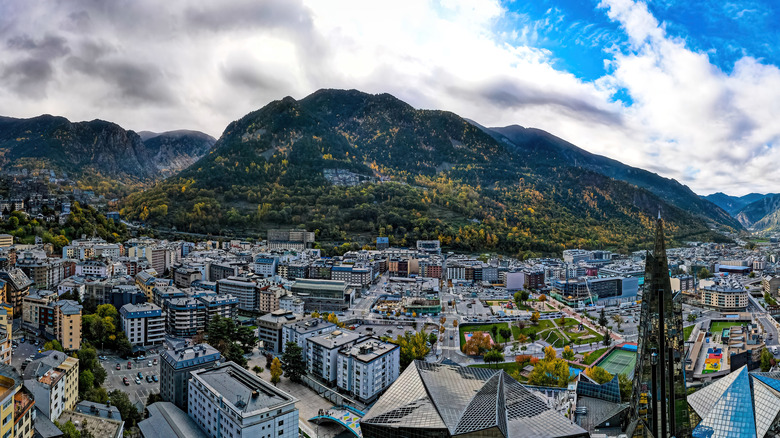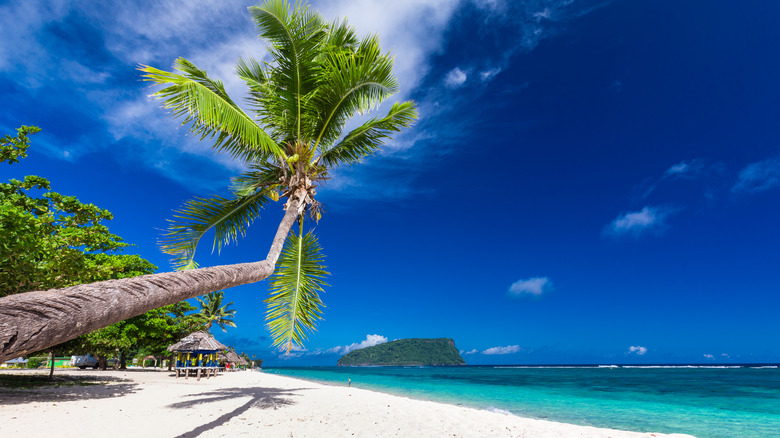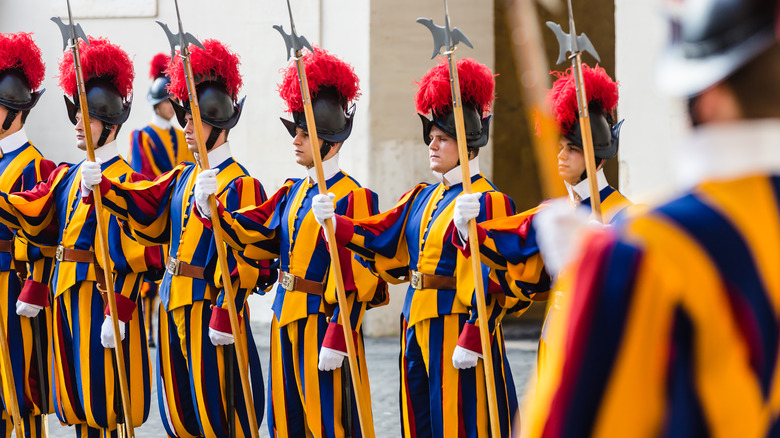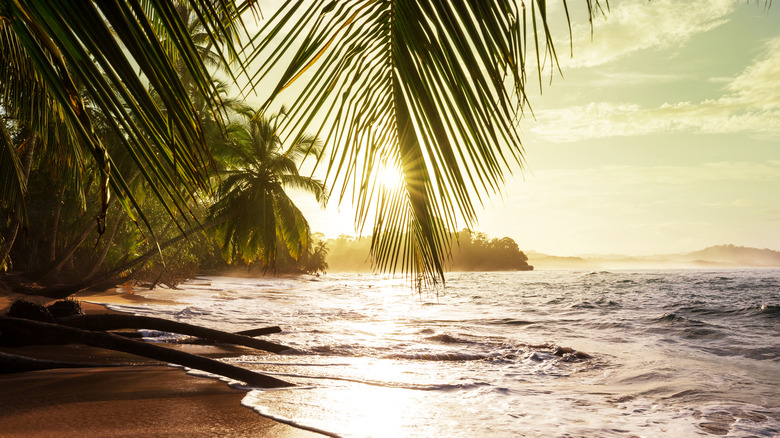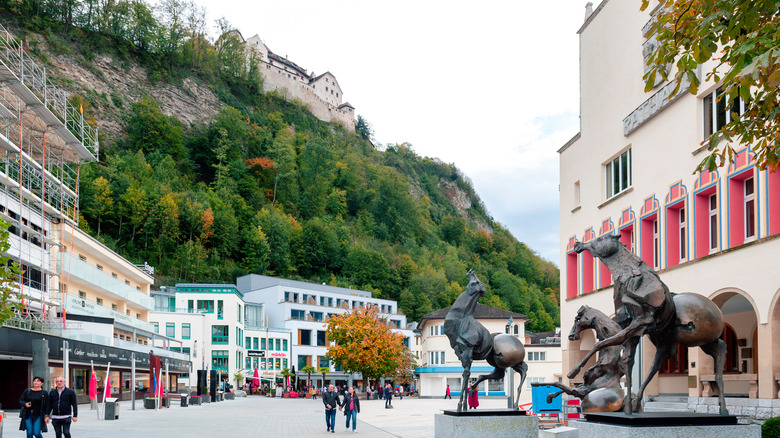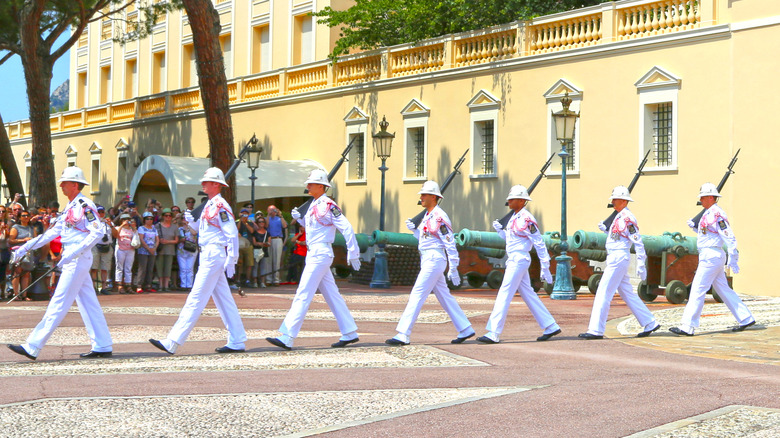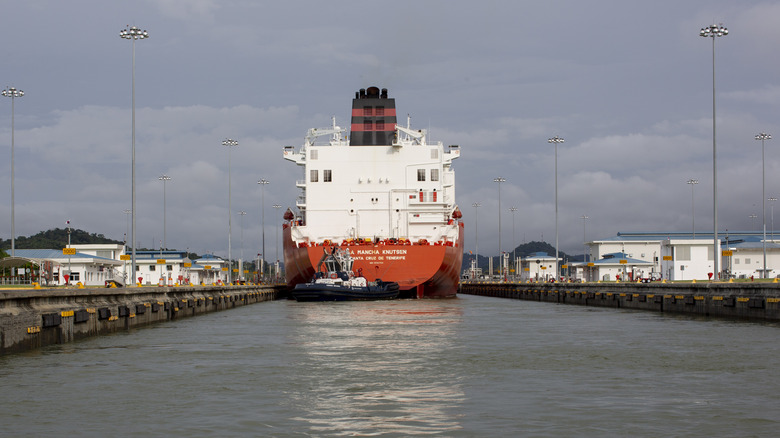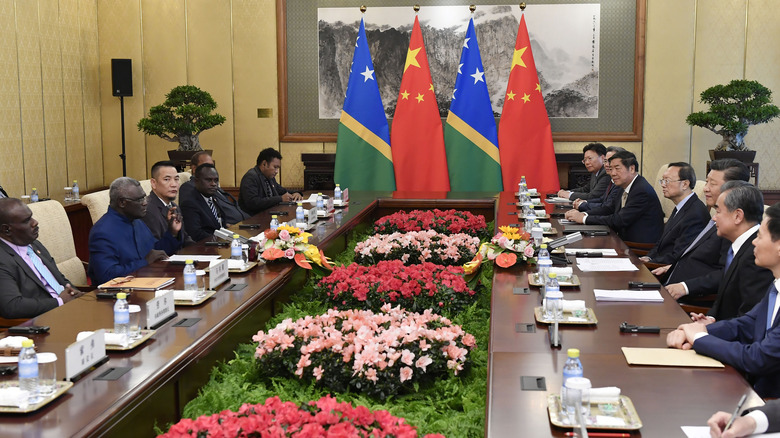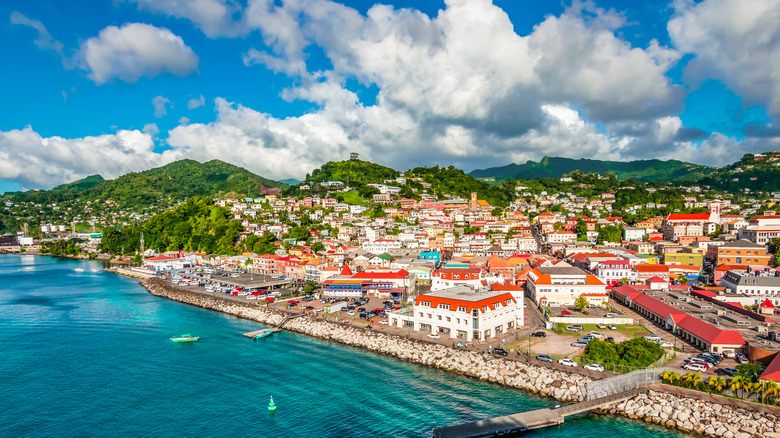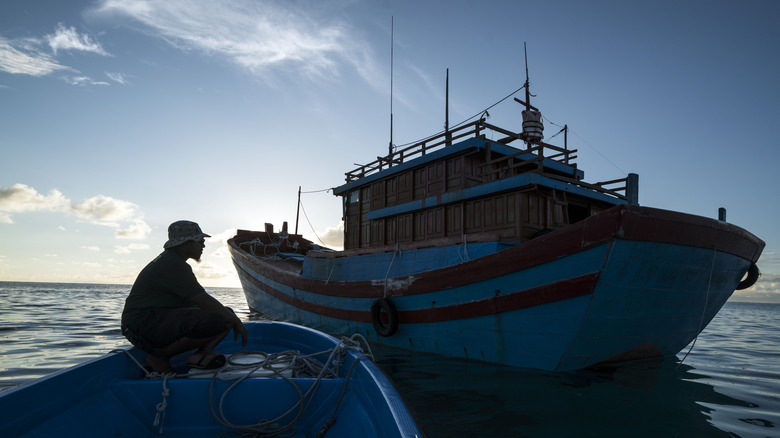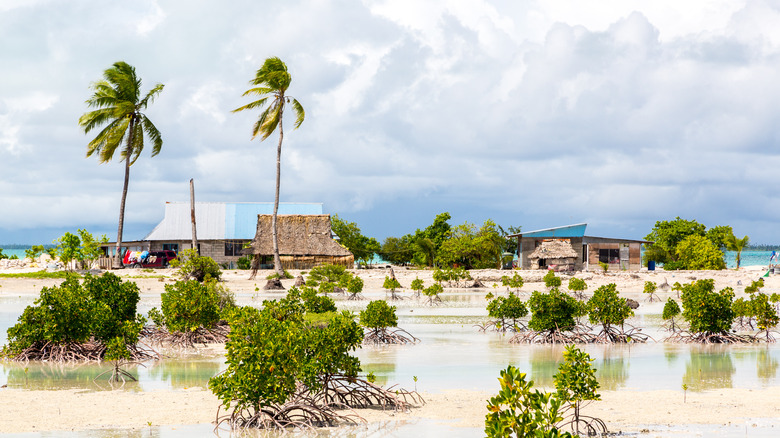These Are The Countries With No Military
John Lennon's 1969 song "Give Peace a Chance" became an anti-war ballad for a generation and more. Lennon was not the first to make calls to end war. The first organized peace movement in the U.S. was, per Swarthmore College, the New York Peace Society, which was founded in 1815. Admittedly most countries definitely did not and do not heed calls for the elimination of the military. A glance at Statista shows that the biggest spender on armed forces was the United States, with $801 billion spent in 2021. The next highest, China, comes in at a respectable, but still distant, $293 billion.
So with such spending, would John Lennon's ghost see any hope for a future without war? There are, in fact, some countries around the world that have fully divested themselves of their armed forces. Most of these countries, admittedly, are not major players in geopolitics. Also, nearly all of them in one way or another rely on larger countries to defend them. But when a country does eliminate its military there are tangible benefits. First of all, you are not spending millions or billions on bullets when the funds can be put to other uses, to grow an economy or provide services. Second, and equally important, countries without militaries are more stable since coup chances are reduced. This stability helps to increase their prosperity. Let's now take a look at some of these countries, to see how it is you can be a country with no military.
Andorra
If you were a quantum particle traveling between Spain and France there is statistically a chance that you would pass through Andorra. This small, landlocked country is one of several micronations in Europe and, as the CIA World Factbook points out, has no military. Andorra's shared history with its two larger neighbors goes back to the late 13th century when, according to Britannica, competition between Spain and France led to the country being ruled by two princes, of which one was from France and the other from Spain. This split-difference system of government only dissolved in 1993 when a constitutional form of government was enacted.
Because of its special relationship with its adjoining nations, the CIA World Factbook tells us that Andorra's defense is provided by both France and Spain. Internal order is maintained by its own policing force. This seems to serve this tiny country of just over 78,000 people well. The GDP per capita income in Andorra is higher than average among European countries, being reported by the World Bank at over $40,000. This comes from an economy based on tourism, retail, and finance.
Samoa
The idyllic and beautiful Pacific island country of Samoa is the center of Polynesian culture. According to Britannica, Samoa, in fact, is considered to be Hawaiki, the original Polynesian homeland from which the islanders engaged in epic voyages across the Pacific to settle islands as distant as Rapa Nui and Hawaii. With the voyages, their culture spread across the Pacific, one that is collectivist and based on kinship. This has perhaps influenced Samoa's current status of being a country without a military.
According to the CIA World Factbook, Samoa maintains ties with New Zealand as an informal ally through a Treaty of Friendship. Signed in 1962, the treaty does not establish a military alliance of any sort, but rather gives Samoa the option of asking New Zealand to represent it internationally and to defend it diplomatically. Military defense is implied. More substantially, Samoa has a police force that is responsible for law enforcement. The government itself only controls some 142 small arms within its armories, according to Gunpolicy.org.
Vatican City
Vatican City is an unusual 0.17-square-mile enclave within the larger city of Rome. As Britannica states, it is the power center of the Roman Catholic Church and a leftover from a period of time when the Church owned and controlled considerable swaths of territory in Italy. Vatican City is technically controlled by the See of Rome and is known for being defended by the famous Swiss Guards.
The Swiss Guards have sometimes been referred to as the "Vatican's Army," but in actuality they are the bodyguards of the pope and the guardsmen for Vatican City — hardly what would constitute a military. All the same, the Swiss Guards have an illustrious history dating back to the early 16th century, when Swiss mercenaries were considered the best soldiers in Europe. Even today, a requirement to join the Swiss Guards is to be a Swiss Catholic. It is a highly desirable job, but with a limited number, fixed at 100 guardsmen in 1979. Vatican City also has the Gendarmerie Corps which, according to the Washington Post, are the police and firefighting units within Vatican City. Most of their work has to do with fighting petty crimes that target tourists, such as pickpocketing.
Costa Rica
The Central American country of Costa Rica has often been held up as a paragon of stability in a region that has historically been troubled with revolutions and disorder. According to Britannica, since the late 1940s Costa Rica has not experienced a coup or serious political disruption. After a civil war that ended in a compromise, Costa Rica established a new constitution in 1949. This constitution eliminated its army, the first time since 1949 any country had done so, as described by UNESCO. As UNESCO stated, "The decision gave institutional strength to the regime of civility of Costa Rica's political life." This experiment resulted in a foreign policy devoted strictly to diplomacy, and it also allowed the country to funnel military expenditure into social development.
This trend toward stability had tangible results. Britannica tells us that wealth is more evenly distributed in Costa Rica than in other Central American countries. The World Bank calls Costa Rica a success story with one of the lowest poverty rates in Latin America. It has also a GDP per capita income of over $12,000, which is many times greater than its northern neighbor Nicaragua and just a little below its southern neighbor Panama (also without a military). It is currently considered a leader in environmental policies as well as ecotourism.
Liechtenstein
In the alpine region between Austria and Switzerland, Liechtenstein has sat as an independent country since 1866. Britannica notes that this country does not have natural resources of value, little agriculture, and no heavy industry to speak of. However, with a strong economy based on tourism and banking, this small country of about 38,000 people had a GDP of over $6 billion in 2019 (per the World Bank) and a not too shabby GDP per capita income of over $175,000. None of Liechtenstein's economy is allotted to the military since, according to the CIA Factbook, it has no standing army. Instead, it has a national police force which, when considering the diminutive population of Liechtenstein, would amount to a police force for a large town or small city in many larger countries.
Curiously, the last time Liechtenstein had an army was in 1866 when, as reported by We Are the Mighty, the principality, which was part of the German Confederation, sent a detachment to guard the Brenner pass between Austria and Italy during the Austro-Prussian War. These 80 soldiers returned with 81 — apparently the extra person was an "Italian friend" who decided to emigrate (per Lonely Planet).
Monaco
Monaco is perhaps the most famous of the microstates of Europe. According to Britannica, this principality is known as a mecca of luxury along the French Riviera, with high-end car races and resorts such as Monte Carlo and its casino. In part fed by its fame, it is a magnet for the wealthy. The World Bank shows that Monaco's GDP per capita income is north of $173,000.
As befits a wealthy microstate, Monaco is headed by a prince as well as a National Council. Monaco has existed for five centuries, with its independence oscillating until 1861 when it secured the sovereignty it enjoys to this day. Because of Monaco's curious position, it does not have a military per se, but it does have, according to Stars and Stripes, a small force called the Carabiniers du Prince which number just over 100 soldiers. Although this force is trained in military drills and tactics, its role is to protect the prince. As the CIA World Factbook points out, Monaco has no regular army. All its other, regular law enforcement functions are given to a police force.
Iceland
Iceland was first settled by Vikings in the late ninth century. Britannica tells us that these Norse developed a commonwealth that was eventually taken over by various mainland Scandinavian powers at different times through its history, first by Norway and then Denmark. However, Iceland finally regained its sovereignty in 1944 as an outcome of World War II. The country subsequently joined NATO in 1949 as one of its founding members.
So here's a country founded by Vikings, who are not exactly known for pacifism, which joined the most powerful military alliance in the world. So what gives? The fact is that Iceland has, despite its Viking roots, been essentially pacifistic throughout modern history, and so, according to the CIA World Factbook, the country does not have a regular military. Sure it has a coast guard and it also has a police force, but it doesn't have an army or a navy. Its role in NATO, as the Barents Observer recounts, is for its territory to be used as a military base, since it is strategically located between North America and Europe. Yet this was not without controversy. To illustrate Iceland's ambivalent relationship with the military and wider geopolitics, riots broke out in 1949 in opposition to the country entering NATO, for fear that joining the organization would pull Iceland into larger conflicts while weakening its culture.
Panama
The Central American country of Panama has been of especial importance to the United States since the early 20th century. Britannica explains that at the time, Panama was a territory of the country of Colombia. The United States meanwhile wanted to build a canal across the narrow country in order to connect the Pacific and Atlantic Oceans. Colombia rejected the offer, so, abetted by the United States, revolutionaries in Panama declared independence in 1903, and the canal quickly followed. The history of Panama through the 20th century was unhappy. Civil unrest and coups brought American intervention on multiple occasions as the country oscillated between democracy and military dictatorship. The last of these dictators was Manuel Noriega, who was known for rigging elections, corruption, and involvement in the illegal drug trade. Noriega eventually provoked the United States to invade and overthrow the government in 1989. When the new government took power, it proposed the abolition of the army, which was accomplished in 1994 through an amendment to its constitution.
The CIA World Factbook tells us that today Panama maintains order through the Panama National Police (PNP), which does have some paramilitary units. These are mainly to deal with terrorist threats and to counter illegal drug trafficking. Since the abolishment of the military, Panama has not seen a single coup threaten its development as a country.
Solomon Islands
The Solomon Islands is a Pacific Island country without an armed force that nevertheless found itself in the middle of a geopolitical dispute. This collection of islands has, according to the CIA World Factbook, a land area a bit smaller than Maryland, and its location east of New Guinea has strategic importance. As described by Britannica, the Solomon Islands was the location of many important battles during World War II, especially Guadalcanal. This highlights how the small nation, which only has a police force, continues to be important to larger countries such as China, the United States, and nearby Australia.
Reuters reported that in April 2022, China and the Solomon Islands had signed a cooperation pact, ostensibly over trade, security, and other matters. Drafts of the agreement showed that it would allow China to use their own police to protect Chinese assets, as well as allow Chinese vessels to restock fuel and supplies in the Solomon Islands. What troubles the United States and Australia is that the deal might eventually lead to the establishment of a Chinese military base in the Solomon Islands, less than 1,200 miles from the Australian coast. One editorial in the Sydney Morning Herald decried the deal, expressing fears over a perceived threat from Chinese expansion into, and potential colonization of, the South Pacific.
Dominica, St. Lucia, Saint Vincent and the Grenadines, and Grenada
The Caribbean Sea is home to a number of countries, some of which have foregone having a military in favor of collective action. The Regional Security System (RSS) was created in 1982 when several countries of the Organization of the Eastern Caribbean States formed a loose agreement to provide mutual defense and assistance as needed. This soon came into play the next year, when violent political unrest gripped the tiny island of Grenada. The forces of the RSS (with a big helping hand from the United States) invaded Grenada in 1983 and ousted the revolutionary government. It was, to put it mildly, a one-sided contest.
The RSS was formalized by treaty in 1996, and, of the signatories, the CIA World Factbook tells us that Dominica, St. Lucia, and Saint Vincent and the Grenadines do not have regular militaries but paramilitary or policing forces instead. As for Grenada, it ended up joining the RSS too in 1985. While some of the other members of the RSS do have military forces, they are all relatively small. The operations of the RSS are mostly concentrated on efforts to stop the illegal drug trade and cross-border crime.
Marshall Islands and Palau
The Pacific Ocean island nations of Palau and the Marshall Islands were ruled by foreign powers for centuries, with the last being the United States. In fact, according to Britannica, the Marshall Islands received its full independence in 1991 and Palau only in 1994. So as strange as it may sound for these countries with a long history of foreign domination, the CIA World Factbook lists them as not possessing a military.
For the Marshall Islands, internal security matters fall under the jurisdiction of two entities that fall under the purview of its Ministry of Justice. The national police force coordinates law enforcement activities throughout the country, with local police forces handling specific matters within their region. The Sea Patrol maintains order over the waterways, a considerable job indeed when considering that the country is composed of 1,200 islets and atolls. Palau has a similar setup and both countries are signatories of a Compact of Free Association, in which the United States agreed to provide for the country's defense in the event of a foreign invasion.
Tuvalu, Kiribati and Nauru
It is a rational and common choice for small countries to turn to larger countries for guarantees of defense. In the case of the three Pacific island nations of Tuvalu, Kiribati, and Nauru, the CIA World Factbook tells us they have forged such a relationship with Australia and, in the case of Kiribati, also New Zealand. This makes sense from Australia and New Zealand's point of view, as all their shipping connections sail through the Pacific and Indian Oceans.
This relationship is usually cemented through the donation of military materials. For example, in 2022, Naval Technology reported that Australia's Department of Defense gave away the first of 21 Guardian-class patrol boats to the Federated States of Micronesia, another small Pacific country without a military. Both Kiribati and Tuvalu are slated to receive boats as well. The ostensible purpose of this equipment is to ensure a "free and open Indo-Pacific," while at the same time being able to monitor fisheries and protect endangered maritime ecosystems.

